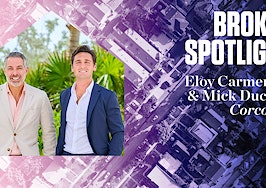Inman events are the best way to connect, learn and grow. Don’t miss the next one, Aug. 3-5 at Inman Connect Las Vegas! Get your ticket now for the best price.
Things changed for Sarita Dua the day she was hit by a car.
The head of the Ask Sarita team in Portland, Oregon, had spent years on the frustrating seesaw of weight loss and weight gain, climbing to a level she was unhappy with while putting work above her health.
The crash was her “aha” moment that has led her to focus not just on her health, but that of her team.
“It was as if that car accident jolted me into just waking up,” she said at the final day of Inman Connect in New York on Thursday. “Instead of being upset that it happened, I was just so grateful I was OK.”
“It began my journey of being selfish and putting myself first,” she told an audience gathered to talk about the importance of focusing on personal and team health and wealth-building.
Along with putting her own personal health higher, Dua said she made changes to her own team culture.
“In life you have your health, you have your loved ones, and then you have wealth,” Dua said. “All the money in the world doesn’t account for those first two.”

Rob Chevez | Photo by AJ Canaria & Mercedes Santiago of MoxiWorks
Mandatory vacation?
COVID was a wakeup call for Rob Chevez, founder of the Caza Group in Virginia.
Similar to the experience of so many others, Chevez found himself stressed and assessing his personal priorities and the stress that working for his firm could put on employees.
“I bought a little river house,” he said. “I realized this river house helped me unplug. My mind was open. I was like, ‘We need to create an environment that’s a safe environment for everyone in the organization to feel like they could unplug.”
The epiphany led to new meetings that focus strictly on how agents and employees at the Caza Group can set themself up for personal wealth, as well as a better work-life balance.
There are 8:30 a.m. energy huddles to discuss mental wellness and the need to unplug from time to time.
A team culture that had always prioritized hard work needed to quickly change to one that praised self-care.
Moderator Wendy Papasan of the Papasan Properties Group in Austin, Texas, had given employees unlimited paid time off. When she found employees weren’t taking it, she required it.
“What we’d done — because my operation side of my team, they’re tired — we required them to take one week of vacation every quarter,” Papasan said. “And then every month each person on my operations team gets a half-day Friday.”
Chevez said when he first heard of Papasan’s policies, he immediately looked into implementing them at his firm.
“When you said that…I called my director of operations and I said, ‘We’re doing this,’” Chevez said. “A week off every quarter would be unbelievable.”
The leaders on stage stressed the importance of focusing on this sort of employee wellness as a way of addressing low retention that threatens their businesses.
“A lot of them just simply burn out,” she said. “If there’s anything that’s a thread for today, it’s this idea of an indie brokerage or a teamerage or a team, and the reason we can do that is to prevent burnout, which is a deterioration of your mental health.”
“If you’re not having these conversations with your team, if you’re just [conducting] business as usual,” she said, “you’re going to end up losing everyone on your team.”




















